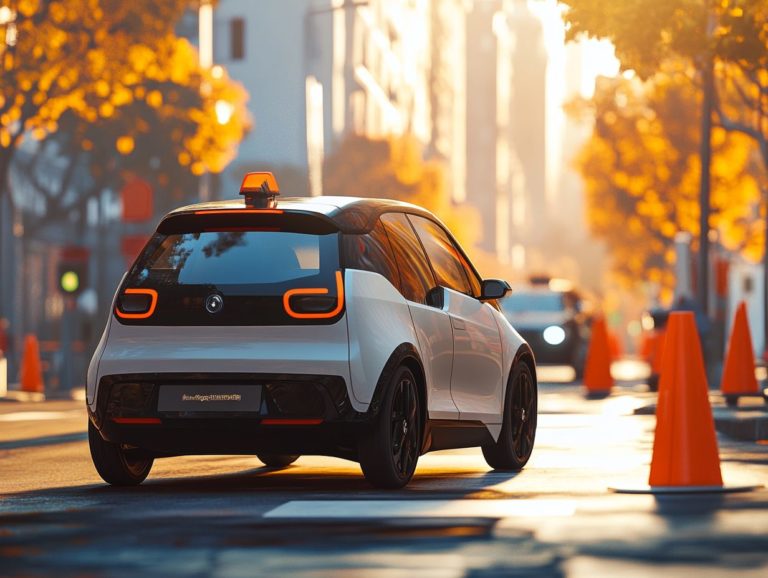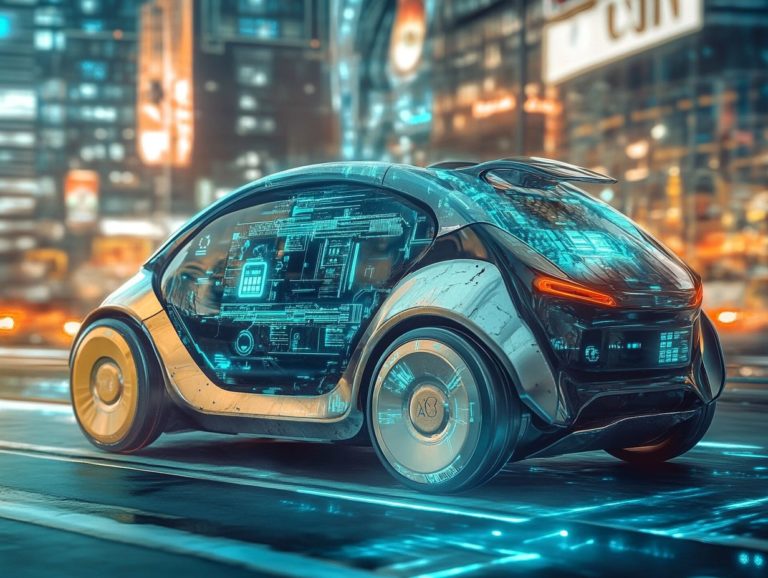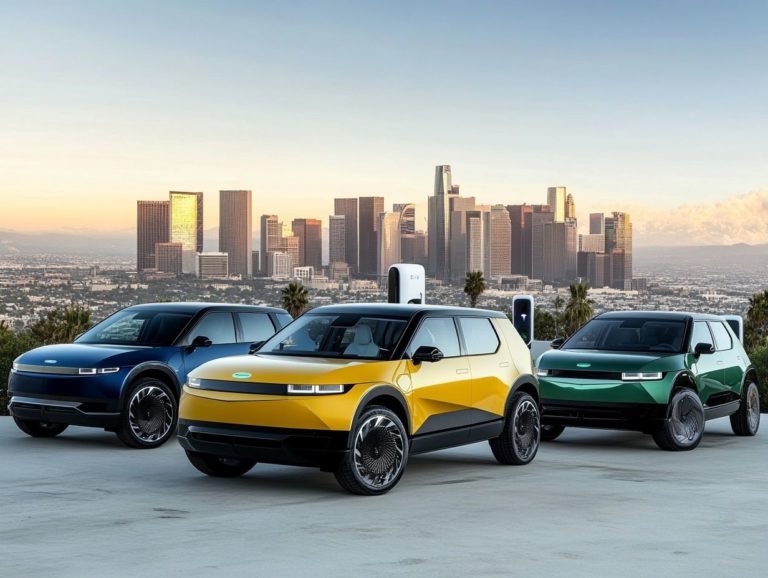A Guide to EV Maintenance Costs
Jump into the world of electric vehicles (EVs) and discover why they are the future of driving! Grasping the nuances of their maintenance costs is essential for you as a prospective owner.
This guide delves into the factors that influence EV maintenance expenses, including battery life, parts availability, and environmental conditions. You ll find valuable tips for keeping these costs manageable through regular maintenance and smart driving habits.
This guide compares EV maintenance to gasoline vehicle maintenance. It showcases the long-term savings and environmental advantages of making the switch.
Let s explore all the essentials together!
Contents
- Key Takeaways:
- Understanding the Basics of EVs
- Factors Affecting EV Maintenance Costs
- How to Reduce EV Maintenance Costs
- Comparing EV Maintenance Costs to Gas-Powered Cars
- Frequently Asked Questions
- How much does it cost to maintain an electric vehicle?
- Are EV maintenance costs more expensive than gas-powered vehicles?
- Do electric vehicles require less maintenance than gas-powered vehicles?
- Are there any government incentives for EV maintenance costs?
- How much does it cost to replace an electric vehicle battery?
- How can I reduce my electric vehicle maintenance costs?
Key Takeaways:
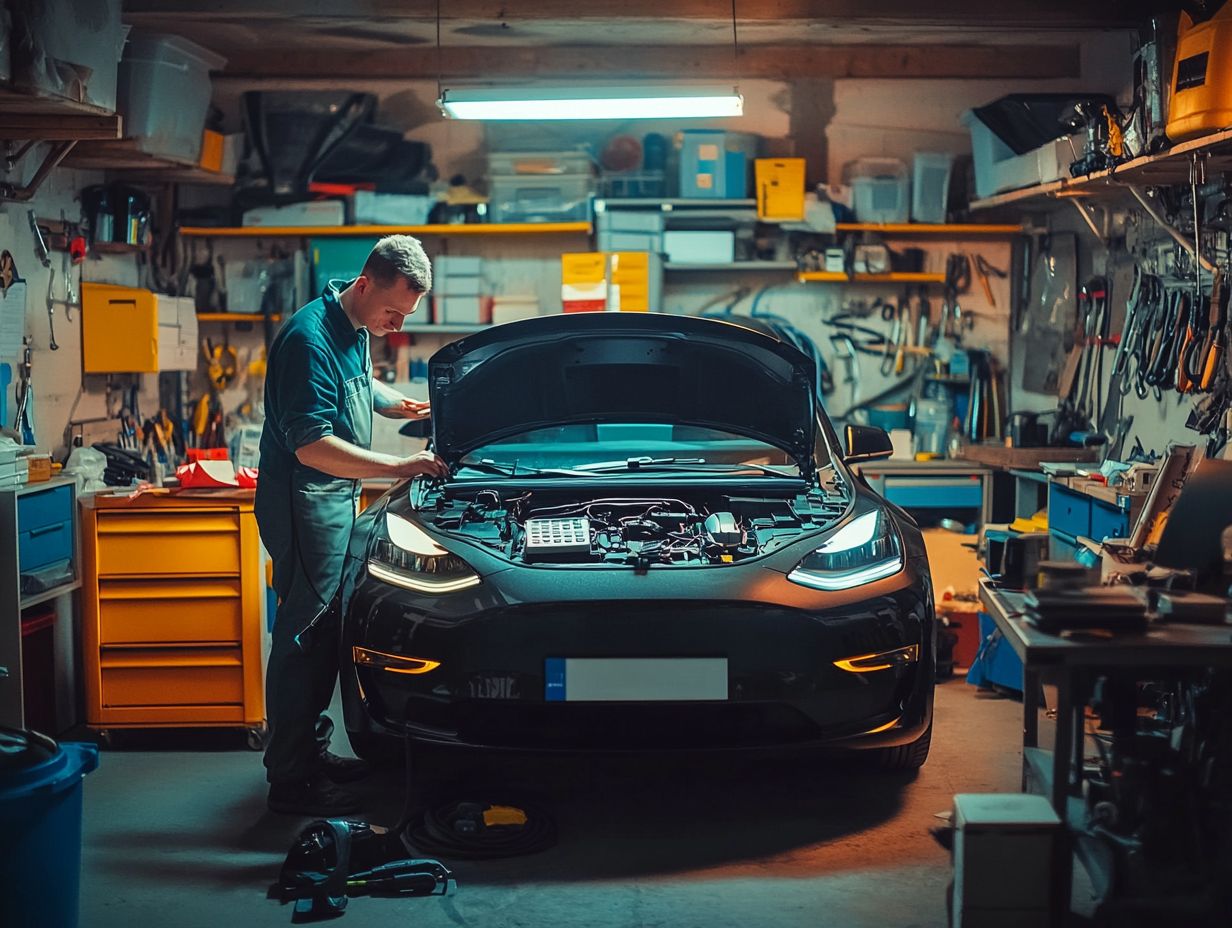
- Regular maintenance and inspections can help reduce EV maintenance costs in the long run. They also improve the vehicle’s performance and lifespan.
- Proper charging and driving habits, like avoiding rapid charging, preserve the battery. This can lower overall maintenance costs.
- While EVs have slightly higher upfront costs, the long-term savings and environmental benefits make them a smart choice.
Understanding the Basics of EVs
Electric vehicles (EVs) represent a major change in transportation. They differ from gasoline-powered cars by using electric power stored in battery storage systems.
Models like the Chevy Bolt, Ford Lightning, and Tesla Model 3 show the variety of options available as automakers embrace sustainable mobility.
This transition is bolstered by an expanding charging network and advancing technology, making EVs more appealing than ever.
Factors Affecting EV Maintenance Costs
Knowing the factors that affect EV maintenance costs is crucial for potential owners. For a deeper insight, understanding EV insurance and maintenance can help, as these costs can vary significantly compared to traditional gasoline-powered cars.
While EVs generally have lower maintenance expenses due to fewer moving parts, understanding the maintenance needs of EVs like battery upkeep and routine inspections remains critical.
Understanding maintenance schedules for models like the Chevy Bolt or Ford Lightning is important.
Battery Life and Replacement
Battery life and replacement are key aspects of electric vehicle maintenance and affect both longevity and overall costs. Proper battery upkeep ensures optimal performance and can extend your EV’s lifespan.
Familiarize yourself with warranty terms from manufacturers, as coverage can vary. Regular check-ups are crucial for monitoring battery health addressing minor issues early can prevent costly replacements.
Avoiding extreme temperatures and using optimal charging techniques enhances battery longevity. Replacement costs can be high, so knowing these factors helps you make informed decisions and protect your investment in electric transportation.
Cost of Parts and Labor
The cost of parts and labor is a significant consideration when factoring in the maintenance of electric vehicles. This directly influences your overall expenses. Unlike traditional internal combustion engine vehicles, EVs often need special parts and skilled technicians for repairs, which can change your average maintenance costs.
Several variables come into play, including the availability of these unique components and the ever-changing market rates for professional service. For example, in some regions, disruptions in the supply chain for electric vehicle parts can lead to unexpected price increases.
Labor costs vary significantly based on the technician’s expertise and the complexity of the repair. Regular diagnostic reports and routine maintenance checks are essential to prevent costly repairs in the future. This ensures critical systems like the battery and electric drive unit operate at peak performance while helping you maintain control over your maintenance budget.
Environmental Factors
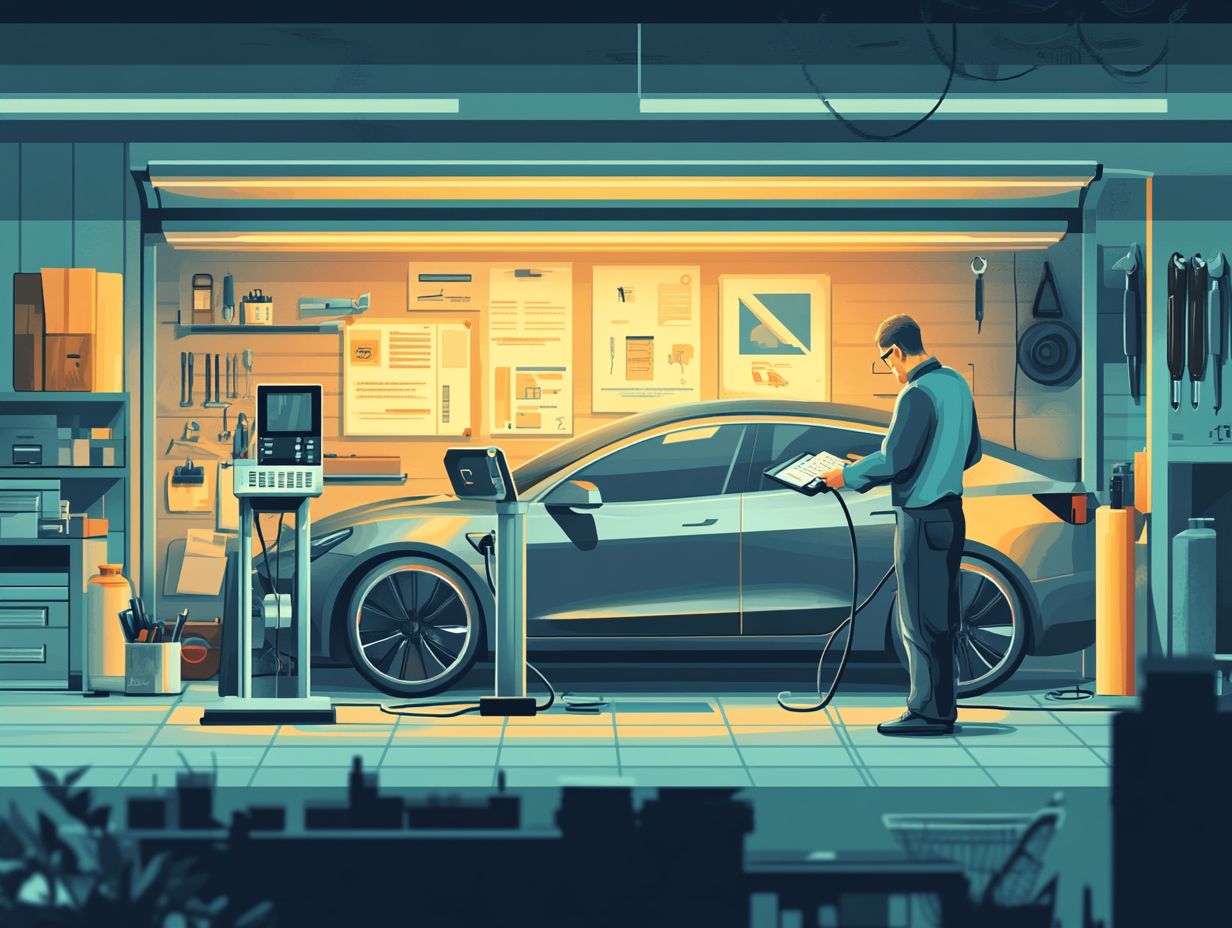
Environmental factors play a pivotal role in the operation and maintenance of electric vehicles. They shape everything from your driving habits to the availability of charging infrastructure. By understanding how these elements influence maintenance checks and overall vehicle performance, you can make informed decisions about your EV.
For instance, extreme temperatures can significantly impact battery life. High heat may speed up degradation, while cold weather can hinder charging efficiency. Ensure that charging stations are strategically placed across various climates to keep your EV operational, as inadequate infrastructure could lead to inconvenient situations and increased operational costs.
Your driving routine whether it involves frequent short trips or long-distance travel will determine your maintenance schedule and influence the longevity and reliability of your vehicle. By being aware of these environmental factors, you empower yourself to adapt your habits and planning, which will greatly enhance your ownership experience.
How to Reduce EV Maintenance Costs
Reducing maintenance costs for your electric vehicle requires a proactive strategy focused on routine practices and a well-organized maintenance schedule. By following essential resources for EV maintenance, you can slash expenses and ensure that your EV remains in peak condition, ultimately extending its lifespan and performance.
Regular Maintenance and Inspections
Regular maintenance and inspections are crucial for keeping your electric vehicle healthy. By adhering to a comprehensive maintenance plan that includes routine checks and safety inspections, you can significantly reduce unexpected repair costs and enhance your vehicle’s overall performance.
Prioritizing these tasks allows you to prevent potential issues that might disrupt your daily commutes. It s not just about keeping the battery in peak condition; regular tire rotations are essential as well. They help maintain even tread wear, improving handling and extending tire lifespan.
Safety inspections are invaluable; they can identify critical concerns like brake functionality and lighting efficiency, ensuring you stay safe on the road. By committing to these vital maintenance measures, you can enjoy a more reliable and enjoyable driving experience while maximizing your investment in your electric vehicle.
Proper Charging and Driving Habits
Proper charging and driving habits are essential for maximizing the efficiency and lifespan of electric vehicles. These practices significantly impact both battery maintenance and driving range. By understanding how to effectively use charging infrastructure and cultivating good driving practices, you can achieve lower maintenance costs and enhanced performance.
As an electric vehicle owner, it’s crucial to be mindful of your charging routines. Avoid frequent fast charging, and don t let the battery deplete completely. Establishing a consistent charging schedule promotes healthier battery cycles and helps ensure your vehicle stays in top shape.
Smooth driving techniques, such as gentle acceleration and deceleration, can greatly improve energy efficiency on the road. These habits not only make for a more enjoyable driving experience but also extend your battery’s longevity, reducing the need for costly replacements.
By embracing these practices, unlock the full potential of your electric vehicle and enjoy the journey for years to come.
Comparing EV Maintenance Costs to Gas-Powered Cars
When you compare the maintenance costs of electric vehicles (EVs) to those of gas-powered cars, you’ll uncover notable disparities in expenses and overall vehicle performance that can illuminate your buying decision.
Electric vehicles typically incur lower maintenance costs due to their streamlined components and reduced number of moving parts. To maximize these savings, understanding how to keep track of your EV’s maintenance can be beneficial, making EVs an increasingly appealing option.
Cost Savings Over Time
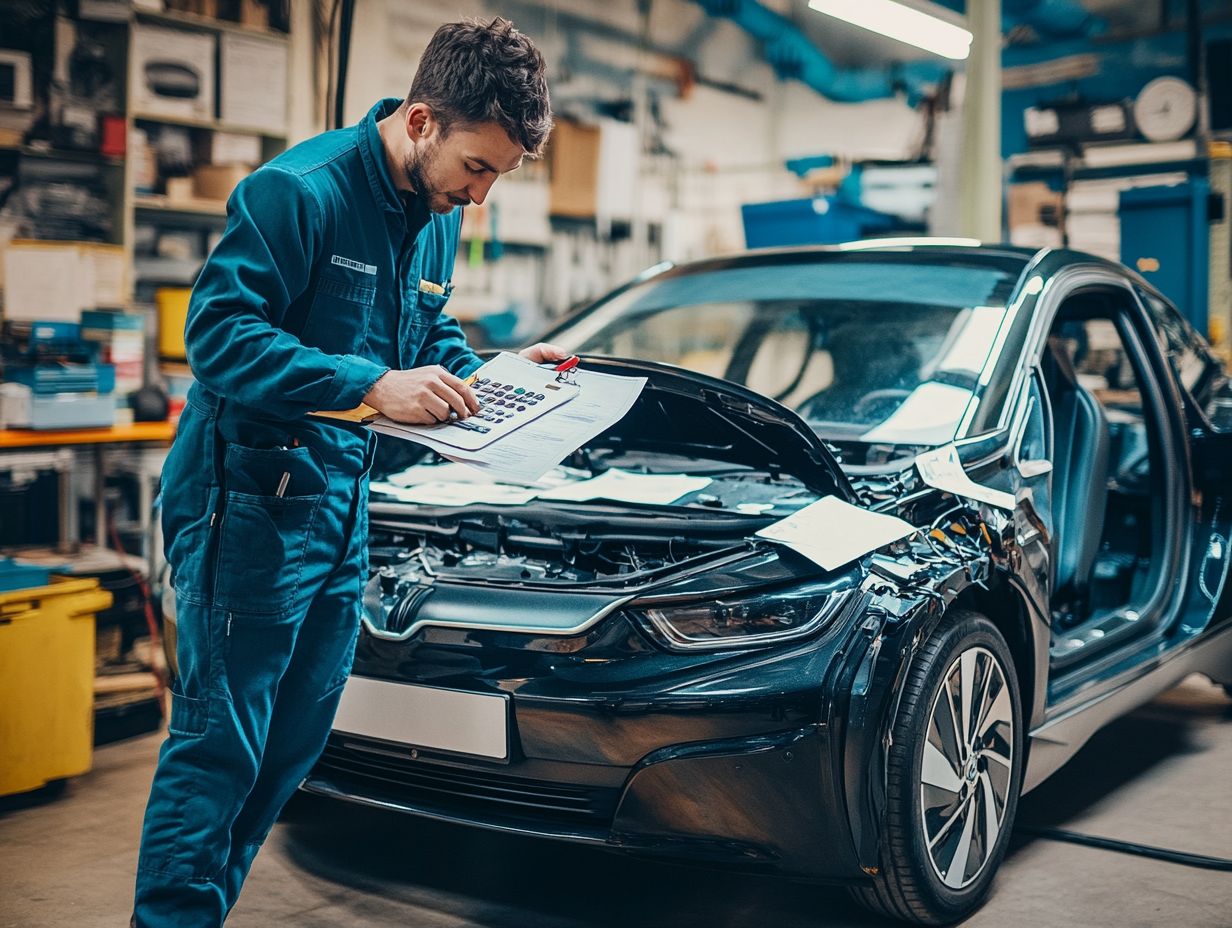
The cost savings over time when you own an electric vehicle instead of a gas-powered car can be substantial. Lower maintenance expenses and reduced fuel costs contribute to these savings. It’s crucial to understand how depreciation affects these savings, especially if you’re considering investing in EV technology.
Electric vehicles generally have fewer moving parts, resulting in less wear and tear over time and minimal maintenance costs. Plus, electricity is usually cheaper than gasoline, leading to significant savings at the pump. EVs often enjoy slower depreciation rates due to increased demand and available tax incentives, enhancing their overall value retention.
By considering these factors, you can see how the economic advantages of switching to electric not only support environmental responsibility but also represent a financially savvy choice in the long run.
Environmental Benefits
The environmental advantages of electric vehicles extend well beyond their zero-emissions operation. They also positively impact the maintenance costs associated with traditional gas-powered cars. By reducing wear and tear on vital components and lessening environmental harm, electric vehicles play a crucial role in shaping a more sustainable future.
Transitioning to electric vehicles eases the burden of frequent repairs that plague gas-powered cars and alleviates the strain on our planet s precious resources. The simplicity of EV mechanics, characterized by fewer moving parts, results in lower maintenance costs over time.
As these vehicles harness renewable energy sources, their operation significantly reduces fossil fuel consumption and greenhouse gas emissions. With cities worldwide prioritizing green initiatives, embracing electric vehicles fosters cleaner urban environments, ultimately enhancing public health and contributing to the fight against climate change.
Final Thoughts and Recommendations
Understanding the nuances of EV maintenance is essential for you to get the most out of owning an electric vehicle. Learning about understanding EV maintenance myths ensures a seamless and cost-effective experience.
Regular check-ups not only prolong your vehicle s lifespan but also enhance its performance efficiency. By being aware of the specific requirements related to battery care (how you maintain your vehicle’s battery to extend its life), tire health, and software updates, you can take a proactive approach to maintenance.
Incorporating practical driving habits like optimal charging routines (charging your vehicle at the best times to save energy and cost) and moderate acceleration can significantly elevate your overall driving experience, leading to reduced wear and tear. Engaging with local communities or forums is another excellent way for you to stay updated on the latest trends and tips within the EV space.
By embracing these practices, you can enjoy a thrilling and budget-friendly journey, fully realizing the benefits that electric vehicles promise. Start implementing these tips today for a better driving experience!
Frequently Asked Questions
How much does it cost to maintain an electric vehicle?
The cost of maintaining an electric vehicle varies based on the model, but on average it can range from $1,500 to $5,000 per year. This includes routine maintenance such as tire rotations, brake replacements, and battery checks.
Are EV maintenance costs more expensive than gas-powered vehicles?
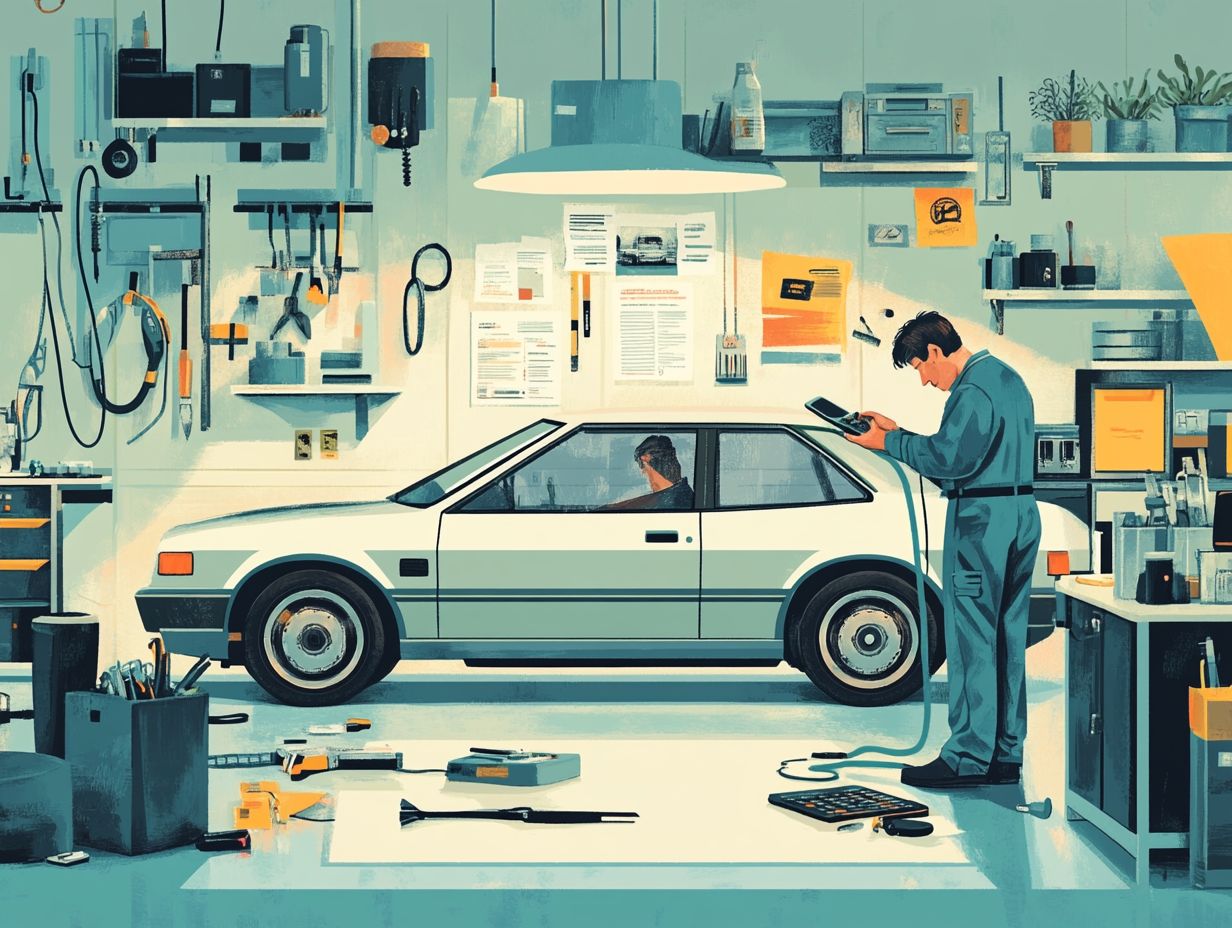
No, in fact, EV maintenance costs tend to be lower in the long run compared to traditional gas-powered vehicles. This is because EVs have fewer moving parts that require maintenance, and electricity is typically cheaper than gas. For more information, check out understanding EV regulations and maintenance.
Do electric vehicles require less maintenance than gas-powered vehicles?
Yes, electric vehicles have fewer components that require maintenance compared to traditional gas-powered vehicles. This means fewer oil changes, spark plug replacements, and transmission repairs.
Are there any government incentives for EV maintenance costs?
Yes, some states offer tax credits or rebates for purchasing and maintaining an electric vehicle. Check with your local government to see if you qualify for any incentives.
How much does it cost to replace an electric vehicle battery?
The cost of replacing an electric vehicle battery can range from $5,000 to $10,000, depending on the make and model of the vehicle. However, this cost is typically spread out over the lifetime of the vehicle and may be covered under warranty.
How can I reduce my electric vehicle maintenance costs?
To reduce your EV maintenance costs, it is important to keep up with routine maintenance and follow the manufacturer’s recommended maintenance schedule. Additionally, learning how to estimate EV ownership costs can provide insights on managing expenses. Driving efficiently and avoiding aggressive driving can also help prolong the life of your EV and reduce maintenance costs.



